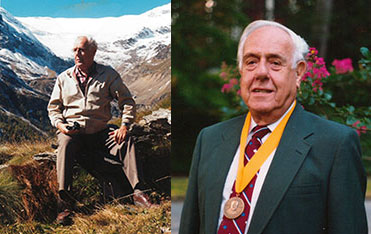In Memoriam: Geoffrey G. Eichholz
1920-2018
by Jack Lang and Thomas Johnston

Geoffrey Gunther Eichholz, PhD, died in Atlanta, Georgia, on 8 January 2018, at the age of 97. His longtime companion and partner, Robert James Moon, confirmed his death from complications of a stroke.
Dr. Eichholz was an educator, scientist, and scholar whose distinguished career led to the establishment of the Department of Nuclear Engineering and Health at the Georgia Institute of Technology in Atlanta. As a young man, Geoffrey fled Germany in 1939 at the direction of his parents to escape the tyranny of Nazi oppression.
Geoffrey was born 29 June 1920 in Hamburg, Germany, to Max and Adele "Daisy" Elias Eichholz. His father was a lawyer, a member of the Hamburg City Parliament, and a vocal opponent to the Nazi regime and party, resulting in his persecution, multiple arrests, and eventual death in the Auschwitz concentration camp in 1943. Geoffrey was educated at Johanneum Gymnasium Hamburg and attended Berlin Technical University until November 1938, when the Nazi party expelled him during Kristallnacht. Fortunately, he avoided arrest during those difficult days of Jewish persecution as he witnessed the destruction and burning of synagogues and other atrocities.
In early 1939, Geoffrey was awarded a Refugee Scholarship from Harvard University, which enabled him to secure a transit visa. In March 1939, he relocated from Germany to England, and he was reunited with his mother in February 1940. Between 1939 and 1947, Geoffrey continued his college education at Bristol University and the University of Leeds. In the war years and afterward, he interacted with notable scientists as a student and research associate. He served in the Admiralty Signal Establishment, working with microwaves and microguides as part of the war effort. Upon successful completion of course requirements, passing his oral examination, and publication of his thesis on magnetic resonances at microwave frequencies, Geoffrey completed his Doctorate of Philosophy at the University of Leeds in September 1947. Later that year, he was offered the position of assistant professor at the University of British Columbia in Vancouver. Upon acceptance, Geoffrey completed a long trip to Vancouver involving five days at sea, followed by six days on a train.
Geoffrey worked in Canada as an educator and scientist until 1963, when he was recruited by the Georgia Institute of Technology (Georgia Tech) as a professor in the newly established nuclear engineering program. He was involved for 25 years at multiple levels of the Georgia Tech education ladder. He taught, researched, wrote, and served in leadership roles and was a longtime committee member in both master and doctoral programs. During his tenure, he was integrally involved in curriculum development for the nuclear engineering programs that included health/medical physics. In addition to being an educator, Geoffrey was involved in many scientific research projects at Georgia Tech and he authored or coauthored numerous scientific publications that included textbooks, reviews, articles, and journals. In 1975, he was named Regents' Professor of Nuclear Engineering. In 2005, Georgia Tech established the Geoffrey G. Eichholz Faculty Teaching Award in his honor. He was a fellow in the American Nuclear Society and Health Physics Society (HPS) and received the HPS Robley D. Evans Commemorative Medal.
In addition to his partner, Robert Moon, Geoffrey is survived by two nieces, Mrs. Julie Burke and Ms. Deirdre Hamilton, and nephew Mark Hamilton, all of Vancouver, British Columbia, Canada. Remembrances may be made by check to the Georgia Tech Foundation (with Geoffrey Faculty Teaching Fund written on the memo line) and mailed to the George W. Woodruff School of Mechanical Engineering, Attn. Development Office, 801 Ferst Drive, Atlanta, GA 30332-0405.



